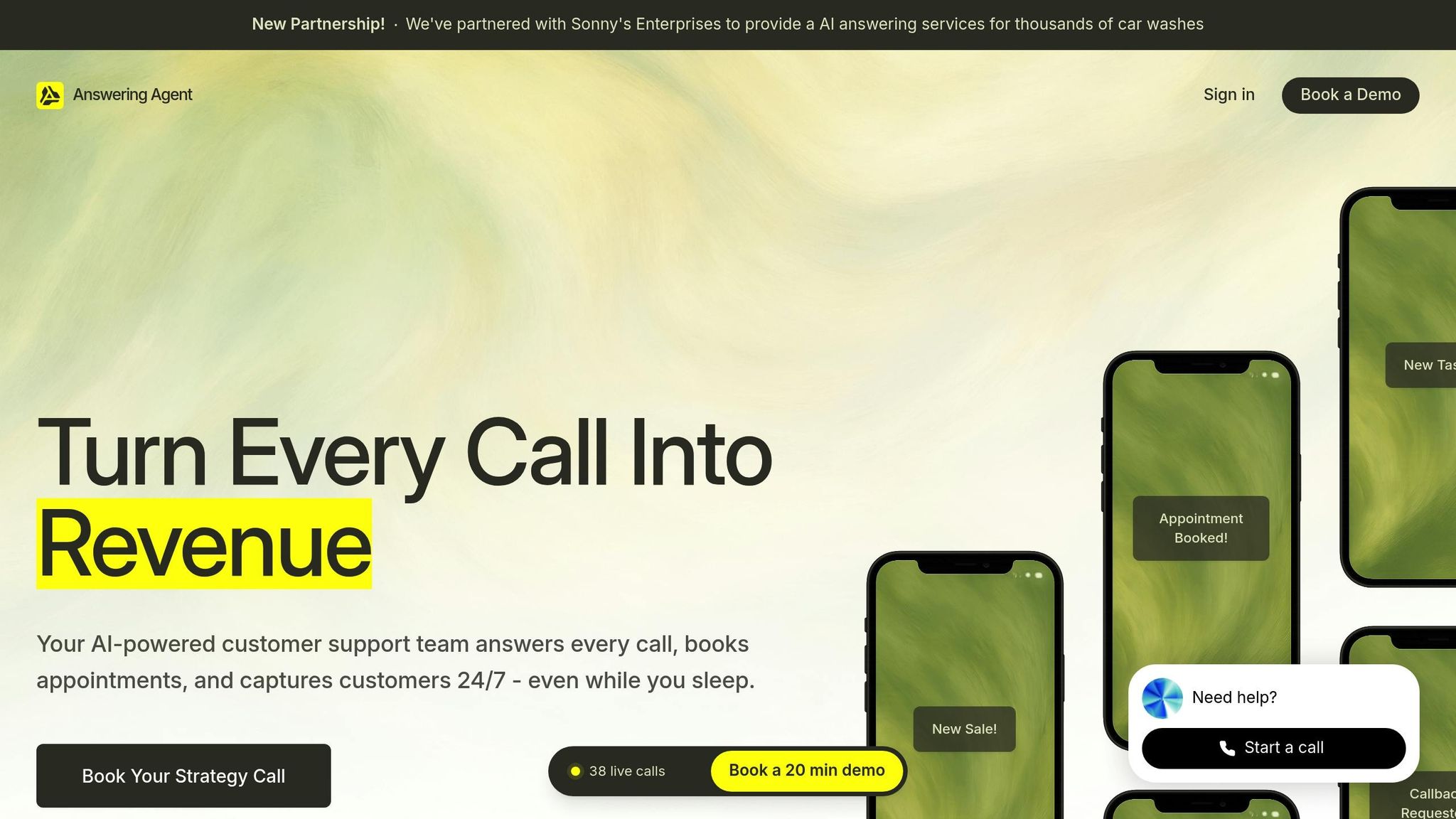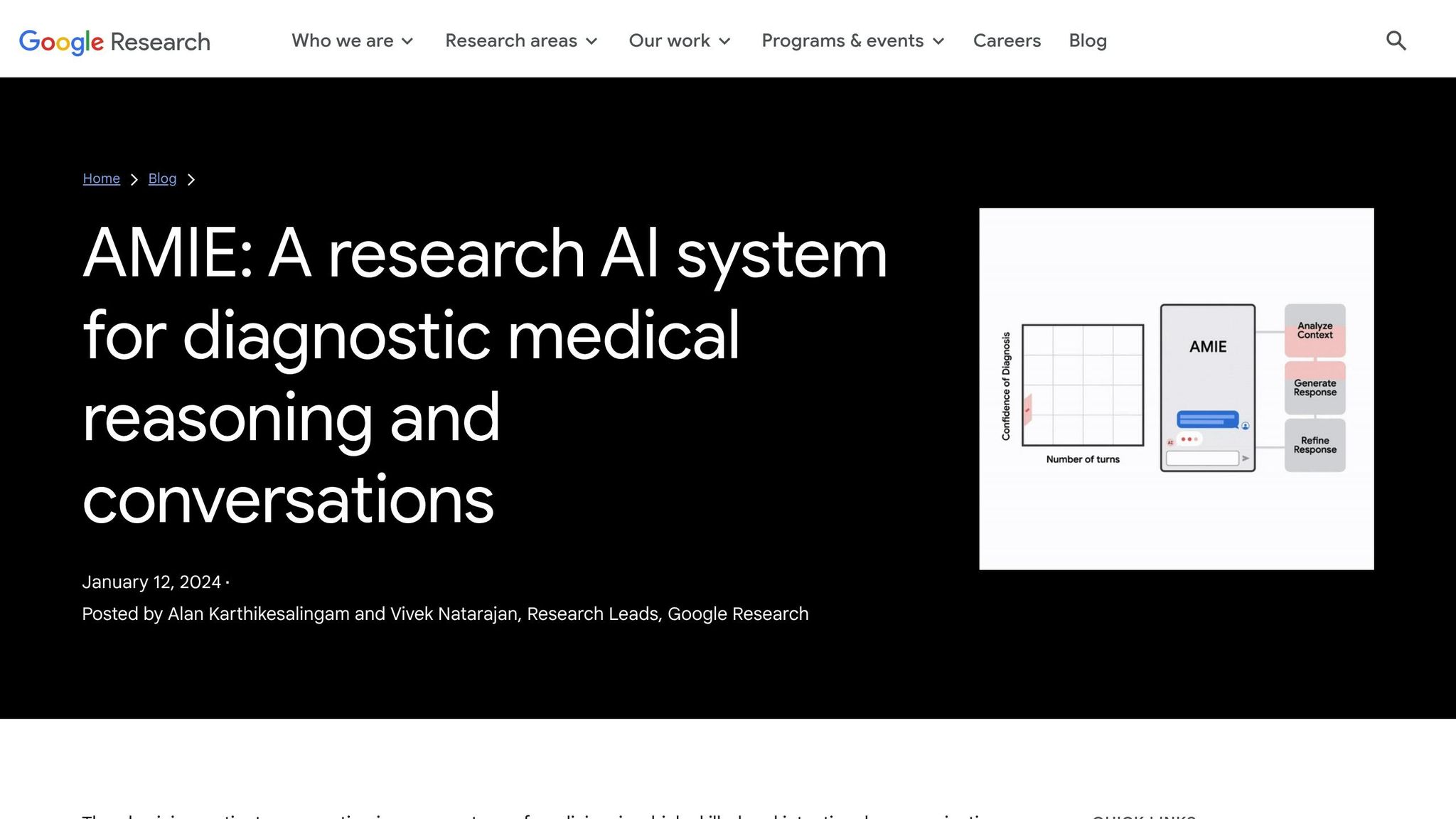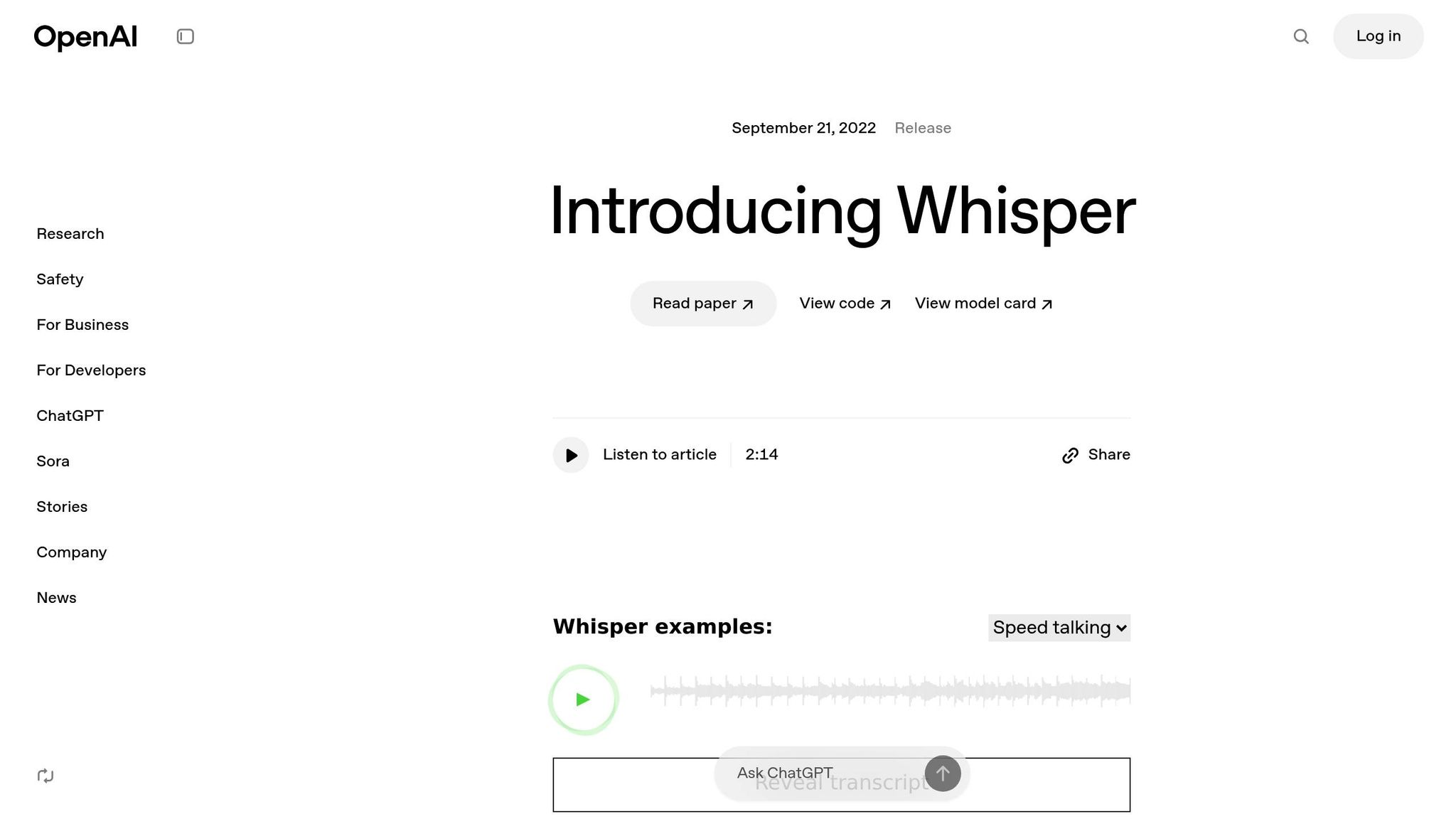Regional Language AI for Patient Calls
Language barriers in U.S. healthcare lead to medical errors, longer consultations, and missed appointments for patients with limited English proficiency (LEP). AI tools like Answering Agent, AMIE, and OpenAI Whisper-based systems are helping bridge these gaps by handling multilingual communication efficiently. Here's a quick breakdown of their key features:
- Answering Agent: Automates 24/7 patient calls, supports multiple languages, integrates with practice management software, and handles high call volumes.
- AMIE: Focuses on multilingual patient interactions, adapting to localized speech patterns, medical terminology, and communication styles.
- OpenAI Whisper: Converts speech to text for major languages, supports code-switching, and integrates into healthcare workflows.
These tools improve patient communication, reduce costs, and ensure compliance with federal regulations like ACA Section 1557, which mandates translation services for LEP individuals. AI-driven systems offer an efficient alternative to costly traditional interpretation services, which can range from $25 to $150 per hour.
Building an AI Voice Receptionist For Dental & Medical Practice (Best Inbound AI Sales Agent 2025)
1. Answering Agent

Answering Agent provides AI-driven phone answering services designed to handle patient communications around the clock. From scheduling appointments to capturing leads and managing inquiries, it operates entirely without the need for human intervention. This system also offers a high degree of customization and integration options to meet the specific needs of healthcare practices.
Language Customization
With customizable voices and scripts, Answering Agent adapts to patients' language preferences, making it especially helpful when bilingual staff aren't available. This feature allows healthcare providers to tailor the system to better serve the communication needs of their patient population.
Integration Capabilities
The system works seamlessly with practice management software, offering a centralized dashboard for managing calls. This dashboard tracks call volumes, schedules appointments, and reviews patient interactions, ensuring everything runs smoothly. Plus, it can handle unlimited simultaneous calls, making it a reliable solution for managing high call volumes during busy times.
2. AMIE

AMIE (Articulated Medical Intelligence Explorer) is an AI system designed to handle multilingual patient interactions. Though still in development, it aims to bridge language barriers and adapt to diverse cultural contexts in healthcare settings.
Language Coverage
For AMIE to succeed, Google must tailor it to accommodate various languages, dialects, and cultural nuances. This requires creating linguistic models that reflect local speech patterns, regional medical terminology, and unique communication styles.
In January 2024, Google Research tested AMIE using 149 medical scenarios from regions like Canada, the UK, and India. These tests highlight Google's efforts to ensure AMIE can function effectively in areas with diverse linguistic and cultural needs. Such rigorous testing helps refine how AMIE interprets and applies region-specific medical language.
Medical Terminology Comprehension
Accurate localization extends beyond simple language translation - it’s about understanding and adapting medical terminology to fit cultural and linguistic contexts. For instance, AMIE faces challenges when translating medical terms that may differ in meaning or usage across regions. A symptom described in one culture might be expressed differently in another, reflecting distinct health systems and practices. To address this, AMIE needs to adapt to local healthcare frameworks, ensuring that its medical vocabulary resonates with patients everywhere.
Cultural Sensitivity
Cultural awareness is just as important as linguistic accuracy when it comes to patient communication. Health perceptions and the way individuals describe pain, symptoms, or discomfort can vary significantly between cultures. AMIE must account for these differences to provide empathetic and effective interactions.
"Cultural Nuances: Health perception and the way people express pain, symptoms, or discomfort can vary widely across cultures. A medical term easily understood in English might be meaningless or carry different connotations in another language. Cultural localization is therefore essential for AMIE to provide a truly helpful and empathetic experience."
To achieve this, AMIE must be trained to recognize and respond to diverse ways of expressing pain and discomfort, ensuring patients feel heard and understood. Google has also emphasized the importance of human expertise in translation and localization to make AMIE effective in non-English-speaking regions.
sbb-itb-abfc69c
3. OpenAI Whisper-based Systems

OpenAI Whisper-based systems specialize in converting speech to text for multilingual patient interactions. These systems play a key role in healthcare communication platforms, enabling transcription and processing of spoken language across diverse regions. While Whisper focuses on technical efficiency, it complements broader AI solutions like Answering Agent and AMIE, which emphasize conversational and culturally adaptive features.
Language Coverage
Whisper supports several major languages frequently encountered in U.S. healthcare, including Spanish, Mandarin, Cantonese, and Arabic. It can even manage code-switching between English and other languages during conversations. That said, its transcription accuracy tends to be higher for widely spoken languages.
Medical Terminology Comprehension
While Whisper performs well in general speech recognition, it struggles with specialized medical vocabulary in regional languages. To achieve better accuracy in this area, healthcare organizations may need to customize the system with domain-specific vocabularies. Fine-tuning the model with medical terminology is often necessary to address these challenges effectively.
HIPAA Compliance
For data privacy, Whisper can be deployed locally, ensuring sensitive information stays on-site. Alternatively, cloud-based implementations can meet HIPAA requirements by using strong encryption and establishing Business Associate Agreements. These measures help protect patient data while enabling secure, multilingual workflows in healthcare settings.
Integration Capabilities
As an open-source tool, Whisper offers flexibility for integration into existing systems. Developers can incorporate it into electronic health records, patient portals, or call center software. Many healthcare organizations also use Whisper with interactive voice response (IVR) systems for tasks like patient intake, appointment scheduling, and basic symptom reporting. This approach enhances multilingual support without requiring a complete overhaul of current workflows.
Cultural Sensitivity
One limitation of Whisper is its inability to adapt to cultural nuances. Without cultural awareness, the system may miss important context in patient communications. To address this, healthcare providers often rely on human interpreters or culturally trained staff to ensure accurate and sensitive interactions. This highlights the importance of combining Whisper’s technical capabilities with human expertise to deliver a more comprehensive solution.
Advantages
After examining AI workflows in detail, the benefits of Answering Agent are clear.
One standout feature is its ability to improve patient communication in regional languages, making interactions more inclusive and accessible. Operating around the clock, Answering Agent delivers natural, human-like conversations, all while allowing for fully customizable scripts. This makes it especially effective for simplifying tasks like appointment scheduling, capturing leads, and managing costs.
While integration needs may differ depending on the practice, the tool’s proven design and straightforward deployment process ensure it’s a dependable choice for healthcare providers. It’s a practical way to enhance communication with a diverse range of patients.
Conclusion
Regional language AI is transforming communication in U.S. medical practices while ensuring compliance with federal regulations. With about 20% of U.S. residents speaking a language other than English at home, having effective language solutions isn't just helpful - it's essential.
Traditional interpretation services can cost up to $3.49 per minute for video or between $25 and $150 per hour for in-person assistance. In contrast, AI-driven options provide a more efficient and budget-friendly alternative. Plus, under the ACA’s Section 1557, healthcare providers are legally required to offer translation services for individuals with Limited English Proficiency (LEP). This dual benefit of cost savings and legal compliance highlights the importance of solutions that prioritize both accuracy and cultural nuance.
For medical practices, the challenge is finding a tool that combines precision, HIPAA compliance, and cultural understanding. Answering Agent’s 24/7 customizable, natural conversations are a strong choice for meeting these regional language needs.
To get started, develop a Language Access Plan by evaluating local language requirements, defining clear policies for language assistance, translating key documents, and incorporating human review for critical materials. This approach ensures both compliance and meaningful patient communication.
FAQs
How does Answering Agent support patients with limited English proficiency while staying compliant with ACA Section 1557?
Answering Agent ensures compliance with ACA Section 1557 by offering strong language assistance for patients who have limited English proficiency. This includes providing services in the language a patient prefers and translating critical documents to guarantee patients can fully understand and access healthcare information.
By focusing on clear and accessible communication, Answering Agent not only helps organizations adhere to legal standards but also enhances the patient experience significantly.
How does AMIE adapt to cultural differences and regional medical language in healthcare settings?
AMIE (Articulate Medical Intelligence Explorer) is built to understand and adjust to differences in regional medical terminology and cultural nuances. By leveraging diverse training datasets that represent a variety of linguistic and regional contexts, it ensures accurate interpretation of symptoms and health concerns, no matter where a patient is from.
What sets AMIE apart is its focus on cultural sensitivity and emotional intelligence. It adapts its communication to match local terminology and conversational styles, helping to foster a more inclusive and welcoming healthcare experience for patients from all walks of life.
How can OpenAI Whisper improve multilingual communication in healthcare workflows?
OpenAI Whisper has the potential to revolutionize multilingual communication in healthcare by offering real-time transcription and translation across more than 90 languages. Its ability to automatically detect languages and provide quick, precise transcriptions can help close communication gaps between patients and healthcare providers, ultimately improving understanding and the quality of care.
That said, occasional inaccuracies or "hallucinations" have been noted, particularly in medical settings. This makes human oversight absolutely necessary to safeguard patient safety and ensure the reliability of critical information.
Related Blog Posts
Related Articles
Call Routing Analytics for Medical Practices
Cut wait times and no-shows with call routing analytics—prioritize urgent calls, boost first-call resolution, and use HIPAA-compliant AI for 24/7 handling.
Multilingual AI Telehealth: ROI for Medical Practices
Multilingual AI telehealth enhances patient care and reduces costs by overcoming language barriers, transforming healthcare practices financially and operationally.
Avoiding Errors in AI Patient Call Translations
Checklist to cut clinically significant errors in AI-translated patient calls: prepare scripts, verify terms, confirm details, and enable human interpreters.
